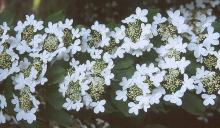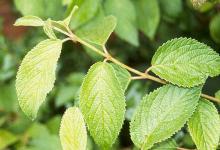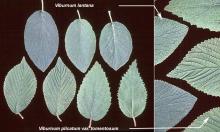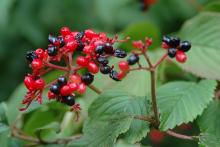Viburnum plicatum var. tomentosum
Common name:
Doublefile Viburnum
Pronunciation:
vi-BER-num pli-KAH-tum to-men-TO-sum
Family:
Adoxaceae, Caprifoliaceae
Genus:
Type:
Broadleaf
Native to (or naturalized in) Oregon:
No
- Deciduous shrub, 8-10(15) ft [2.4-3(4.5) m], horizontal branches. Buds naked (no scales). Leaves opposite, simple, 6-10 cm long, half as wide, ovate, coarsely serrate, pubescent underneath. Flowers white, in umbel-like cluster, large, showy sterile flowers surrounding small fertile ones. Flowers are above the foliage giving a layer effect. Fruit ovoid, 8 mm long, red, finally black.
- Sun to part shade. Performs best in moist, well-drained soil. In summer, may show leaf marginal leaf necrosis in hot dry locations. Does better in such sites if soil surface is protected from sun's heat (e.g., compost, ground covers, etc.)
- Hardy to USDA Zone 5 The taxonomic type that was the basis for first naming this species (V. plicatum) was the sterile, garden form, V. plicatum var. plicatum (Japanese Snowball), with its spherical ("snowball") flower clusters. The wild, fertile, type of the species, V. plicatium var. tomentosum (Doublefile Viburnum), with its flat-topped flower clusters, was discovered later by European botanists and named as a separate form (Flint, 1999). This wild form is native to China and Japan.
- Many cultivars, including 'Mariesii', 'Shasta', 'Shoshoni' and the pink flowered, 'Pink Beauty'.
- Oregon State Univ. campus: many plants on the west side of Burt Hall, along 27th St.














